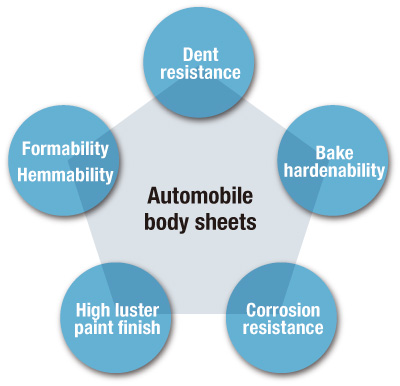
Bake hardenability:
The property to increase the strength of a car’s body surface during the coat baking (electrodeposition coating) process, although the material is soft at the time of press forging.
Types and mechanical properties (Sheet thickness: 1mm)
| Alloy designation | AA*1 | Tensile strength (N/mm2) |
Proof stress (N/mm2) |
Elongation (%) |
Proof stress (after baking)*2 (N/mm2) |
Remarks |
| SG712-T4 | (6116) | 240 | 130 | 28 | 205 | High BH type |
| SG712-T4 High formability type |
(6116) | 245 | 135 | 30 | 170 | High formability type |
| TM30-T4 | (6005) | 210 | 110 | 27 | 190 | High hemmability type |
| TM66-T4 | (6111) | 240 | 115 | 29 | 210 | High formability type, High BH type |
| Alloy designation | Formability | Hemmability | Corrosion resistance | BH effect | Ridging resistance |
| SG712-T4 | 〇 | 〇 | 〇 | 〇 | 〇 |
| SG712-T4 High formability type |
〇+ | 〇 | 〇 | △ | 〇 |
| TM30-T4 | 〇 | 〇+ | 〇 | 〇 | 〇 |
| TM66-T4 | 〇++ | 〇 | △ | 〇 | 〇 |

| Alloy designation | 2% pre-distortion + 20min at 170°C | ||
| Tensile strength (N/mm2) |
Proof stress (N/mm2) |
Elongation (%) |
|
| SG712-T4 | 285 | 205 | 23 |
| SG712-T4 High formability type |
275 | 170 | 23 |
| TM30-T4 | 270 | 190 | 22 |
| TM66-T4 | 285 | 210 | 24 |